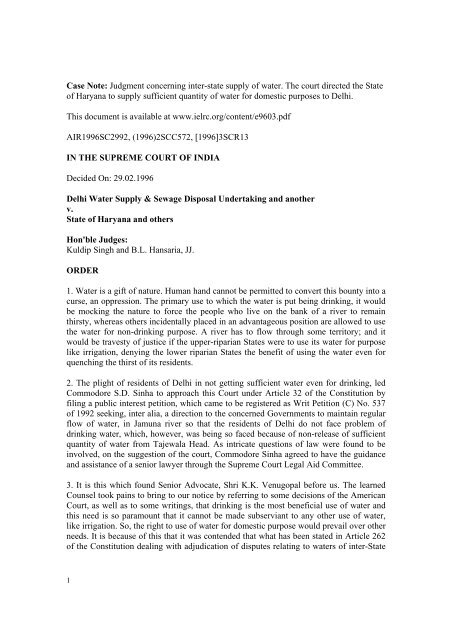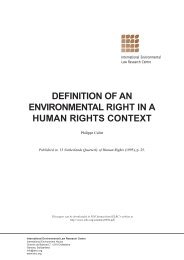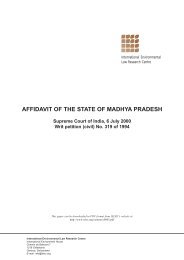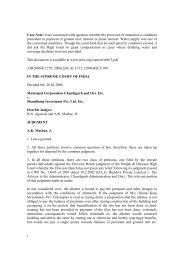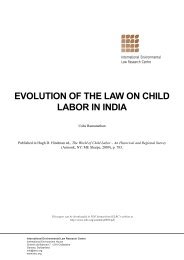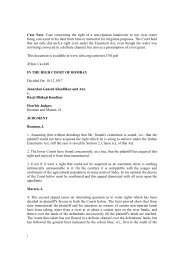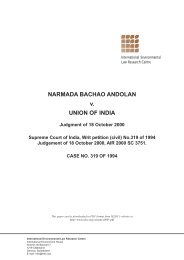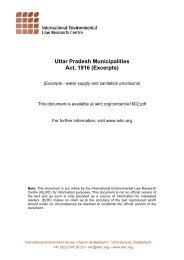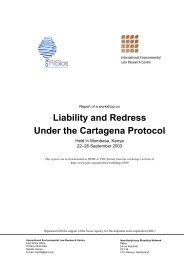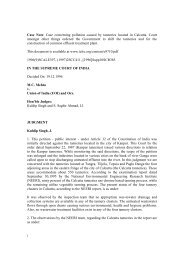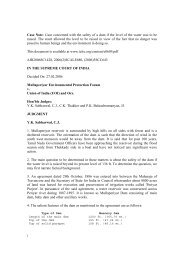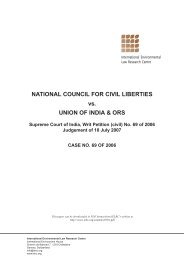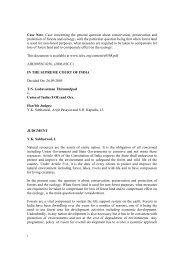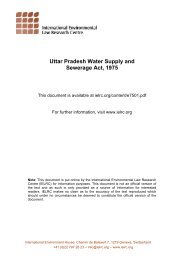Delhi Water Supply & Sewage Disposal Undertaking v. State of ...
Delhi Water Supply & Sewage Disposal Undertaking v. State of ...
Delhi Water Supply & Sewage Disposal Undertaking v. State of ...
Create successful ePaper yourself
Turn your PDF publications into a flip-book with our unique Google optimized e-Paper software.
Case Note: Judgment concerning inter-state supply <strong>of</strong> water. The court directed the <strong>State</strong><strong>of</strong> Haryana to supply sufficient quantity <strong>of</strong> water for domestic purposes to <strong>Delhi</strong>.This document is available at www.ielrc.org/content/e9603.pdfAIR1996SC2992, (1996)2SCC572, [1996]3SCR13IN THE SUPREME COURT OF INDIADecided On: 29.02.1996<strong>Delhi</strong> <strong>Water</strong> <strong>Supply</strong> & <strong>Sewage</strong> <strong>Disposal</strong> <strong>Undertaking</strong> and anotherv.<strong>State</strong> <strong>of</strong> Haryana and othersHon'ble Judges:Kuldip Singh and B.L. Hansaria, JJ.ORDER1. <strong>Water</strong> is a gift <strong>of</strong> nature. Human hand cannot be permitted to convert this bounty into acurse, an oppression. The primary use to which the water is put being drinking, it wouldbe mocking the nature to force the people who live on the bank <strong>of</strong> a river to remainthirsty, whereas others incidentally placed in an advantageous position are allowed to usethe water for non-drinking purpose. A river has to flow through some territory; and itwould be travesty <strong>of</strong> justice if the upper-riparian <strong>State</strong>s were to use its water for purposelike irrigation, denying the lower riparian <strong>State</strong>s the benefit <strong>of</strong> using the water even forquenching the thirst <strong>of</strong> its residents.2. The plight <strong>of</strong> residents <strong>of</strong> <strong>Delhi</strong> in not getting sufficient water even for drinking, ledCommodore S.D. Sinha to approach this Court under Article 32 <strong>of</strong> the Constitution byfiling a public interest petition, which came to be registered as Writ Petition (C) No. 537<strong>of</strong> 1992 seeking, inter alia, a direction to the concerned Governments to maintain regularflow <strong>of</strong> water, in Jamuna river so that the residents <strong>of</strong> <strong>Delhi</strong> do not face problem <strong>of</strong>drinking water, which, however, was being so faced because <strong>of</strong> non-release <strong>of</strong> sufficientquantity <strong>of</strong> water from Tajewala Head. As intricate questions <strong>of</strong> law were found to beinvolved, on the suggestion <strong>of</strong> the court, Commodore Sinha agreed to have the guidanceand assistance <strong>of</strong> a senior lawyer through the Supreme Court Legal Aid Committee.3. It is this which found Senior Advocate, Shri K.K. Venugopal before us. The learnedCounsel took pains to bring to our notice by referring to some decisions <strong>of</strong> the AmericanCourt, as well as to some writings, that drinking is the most beneficial use <strong>of</strong> water andthis need is so paramount that it cannot be made subserviant to any other use <strong>of</strong> water,like irrigation. So, the right to use <strong>of</strong> water for domestic purpose would prevail over otherneeds. It is because <strong>of</strong> this that it was contended that what has been stated in Article 262<strong>of</strong> the Constitution dealing with adjudication <strong>of</strong> disputes relating to waters <strong>of</strong> inter-<strong>State</strong>1
iver or river valleys, read with Inter-<strong>State</strong> <strong>Water</strong> Disputes Act, 1956, could not excludethe jurisdiction <strong>of</strong> this Court to entertain the grievance <strong>of</strong> the petitioner.4. Shri Venugopal in support <strong>of</strong> his contentions-relied upon high authorities <strong>of</strong> <strong>State</strong> <strong>of</strong>Connecticut v. Commonwealth <strong>of</strong> Massachuhetts. 75 Law Ed. 602; AmericanJurisprudence, Vol. 78, 2d p. 293; and CD. Harris v. John Brooks 54 American LawReports 2d series p 1440. We found plausibility in the contentions and were inclined tounfold new jurisprudential arena, despite strong objection to the same being taken by the<strong>State</strong> <strong>of</strong> Haryana, which came to be represented by its Advocate General, Shri H.L. Sibal,at a later stage. Shri Sibal pleaded in the alternative not to base our decision on theprinciple <strong>of</strong> law advanced by Shri Venugopal, as a Memorandum <strong>of</strong> Understanding(MOU) between U.P., Haryana, Rajas-than, Himachal Pradesh and National CapitalTerritory <strong>of</strong> <strong>Delhi</strong>, regarding allocation <strong>of</strong> surface flow <strong>of</strong> Jamuna, had come to be signedon September 12, 1994. The Advocate General urged that we may ask the concerned<strong>State</strong>s to act as per the said MOU. We found merit in the submission and Shri Venugopaltoo raised no objection, and rightly. But, as to act according to the MOU requireddeliberation by Upper Jamuna River Board; and as there was some difficulty in doing sobecause its membership could not be finalised; and as the summer months were fastapproaching, a need was felt by us to give appropriate direction to take care <strong>of</strong> thehardship likely to be faced during those months.5. This led us to pass order dated March 31.1995. The operative part reads as below:After hearing the representatives <strong>of</strong> all the <strong>State</strong>s concerned and the Union <strong>of</strong> India andtheir learned Counsel, we are <strong>of</strong> the view that the Board having been legally constituted,the Memorandum <strong>of</strong> Understanding has become executable under law. The <strong>State</strong> <strong>of</strong> <strong>Delhi</strong>which is in dire need <strong>of</strong> water is, to be given its allocation <strong>of</strong> water with immediate effect.We, therefore, direct all the parties to the Memorandum <strong>of</strong> Understanding to assure thatsufficient water, which according to Mr. Mathur is about 2-1/2 times <strong>of</strong> the seasonalallocation, is released from Tajewala Head so that <strong>Delhi</strong> gets 0.076 B.C.M. for itsconsumption during the period March to June, 1995.We issue special directions to the <strong>State</strong>s <strong>of</strong> Haryana and Uttar Pradesh through theirChief Secretaries <strong>of</strong> the Irrigation Departments to release the water as directed by us forthe consumption <strong>of</strong> <strong>Delhi</strong> from Tajewala Head with effect from April 6, 1995. Whilepassing this order, we take this opportunity to request the respective Chief Ministers <strong>of</strong>the two <strong>State</strong>s <strong>of</strong> Haryana and Uttar Pradesh to direct the concerned <strong>of</strong>ficers/<strong>of</strong>ficials <strong>of</strong>their respective Governments to have our directions regarding supply <strong>of</strong> water to <strong>Delhi</strong>,complied with.We make it clear that this order is as an interim measure till the time the members <strong>of</strong> theBoard and the Review Committee are appointed and they become functional. As soon asthe Board becomes functional, it will be at liberty to pass any direction in the light <strong>of</strong> thisorder as they deem fit and in accordance with the Memorandum <strong>of</strong> Understanding in theinterest <strong>of</strong> all the <strong>State</strong>s which are signatories to the Memorandum <strong>of</strong> Understanding.2
List this writ petition and LA. No. 6 be listed on May 5, 1995 at 2.00 p.m. to review thesituation arising out <strong>of</strong> our order.6. The averment in these two contempt petitions, one <strong>of</strong> which is by the <strong>Delhi</strong> <strong>Water</strong><strong>Supply</strong> and <strong>Sewage</strong> <strong>Disposal</strong> <strong>Undertaking</strong> and the other by Commodore Sinha, is that theaforesaid order was willfully violated by the contemners. The grievance being common,they were heard together and are being disposed <strong>of</strong> by this common order.7. The contemners agree that no water at all was released pursuant to the above order.Their shocking stand is that under the MOU, <strong>Delhi</strong> was not to get any extra water beyondwhat it was getting before March 31, 1995. We are piqued at this statement inasmuch asthe order <strong>of</strong> 13th March would then cease to have any meaning—an exercise in futility.Shri Jaitley appearing for the <strong>Water</strong> <strong>Supply</strong> <strong>Undertaking</strong> would not agree to this stand.The learned Solicitor General, who was requested to assist us in these proceedings,ultimately stated that the stand <strong>of</strong> Haryana may not be correct, though the learnedSolicitor was initially <strong>of</strong> the view that perhaps under the MOU <strong>Delhi</strong> was not entitled toany extra water.8. If the stand <strong>of</strong> Haryana regarding the MOU, as advanced in these proceedings by thelearned Advocate General, be correct, we have no doubt that the <strong>State</strong> had misled theCourt when the order <strong>of</strong> 31st March was passed. It thwarted the passing <strong>of</strong> an appropriateorder which we would have passed but for the understanding given to us on March 31,1995 by Haryana. With summer months ahead, we would have called upon Haryana toallow the required quantity <strong>of</strong> water to pass through the Tajewala Head as we would havethought necessary. The volte-face by Haryana had undoubtedly to be viewed seriouslyand it deserves to be disapproved strongly. We would have indeed found the concernedpersons guilty <strong>of</strong> contempt for misleading the Court and preventing it from passing suchorder as thought just and proper by it, inasmuch as the course <strong>of</strong> administration <strong>of</strong> justicedefinitely got deflected because <strong>of</strong> the twists in the stand <strong>of</strong> the <strong>State</strong>.9. Despite the aforesaid being the position, we are refraining from using our contemptjurisdiction inasmuch as the learned Advocate General has assured that Haryana wouldsee that <strong>Delhi</strong> gets as much <strong>of</strong> water which it is presently receiving through Jamuna, if sodirected by us. It is because <strong>of</strong> this statement that Shri Jaitley submitted that the <strong>Water</strong><strong>Supply</strong> <strong>Undertaking</strong> is not keen to pursue the contempt proceeding. Commodore Sinhatoo has taken the same stand. It is this gesture, along with the statement made by thelearned Advocate-General, which has led us to close this proceeding, despite the highlyobjectionable conduct <strong>of</strong> the concerned persons.10. So far as water supply from river Jamuna to <strong>Delhi</strong> is concerned, we order and directthat <strong>Delhi</strong> shall continue to get as much water for domestic use from Haryana throughriver Jamuna which can be consumed and filled in the two water reservoirs and treatmentplants at Wazirabad and Hyderpur. Both the Wazirabad and Hyderpur reservoirs shallremain full to their capacity from the water supplied by Haryana through river Jamuna.We direct the <strong>State</strong> <strong>of</strong> Haryana through all its <strong>of</strong>ficers who are party to these proceedingsand who have filed affidavits before us not to obstruct the supply <strong>of</strong> water to <strong>Delhi</strong> as3
directed by us at any time. This order <strong>of</strong> ours is not dependent on the MOU mentionedabove or any other proceedings which may be initiated under any other law between theparties.11. We, therefore, close the proceeding by requiring Haryana to make available theaforesaid quantity <strong>of</strong> water to <strong>Delhi</strong> throughout the year. Let it be made clear that anyviolation <strong>of</strong> this direction would be viewed seriously and the guilty persons would bedealt with appropriately. This order <strong>of</strong> ours would bind, not only the parties to thisproceeding, but also the Upper Jamuna River Board.4


